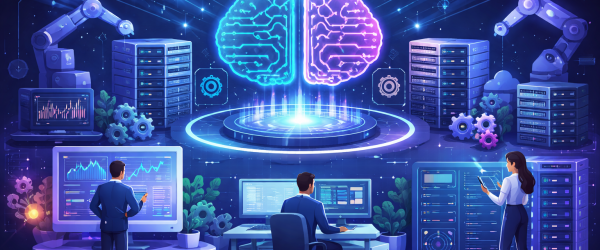Artificial Intelligence (AI) permeates every aspect of our lives, from the gadgets in our homes to cutting-edge medical diagnostics and the vehicles navigating our streets. It’s the driving force behind this transformative era. However, the true impact of AI unfolds in the workplace, where AI analytics revolutionize decision-making processes, enhance productivity, and uncover valuable insights from vast amounts of data, shaping the future of industries across the globe.
Businesses and entrepreneurs are embracing AI with enthusiasm, and for good reason. According to McKinsey, AI adoption rates have more than doubled since 2017, with organizations experiencing significant financial gains, surpassing their competitors.
Interested in how AI can genuinely enhance businesses like yours? While artistic feats like recreating the Mona Lisa in Van Gogh’s style are intriguing, their impact on the bottom line may be limited.
To fully harness the potential of AI, this blog explores the necessity and significance of AI-powered analytics for businesses, outlining their benefits and offering real-world examples of industries bolstering their profits through AI.
If you’re still hesitant, now is the time to embrace AI analytics and unlock its potential to propel your business toward unparalleled success. Let’s delve into how AI analytics is empowering businesses to thrive.
The landscape of business is undergoing a revolution thanks to AI analytics, and the benefits are significant.
AI analytics is fundamentally transforming businesses by providing invaluable insights, enhancing decision-making processes, and fostering innovation across diverse industries. Let’s delve into how this is happening!

Improved Decision Making
AI analytics have the potential to seamlessly analyze voluminous datasets, debunking vital patterns and connections that are often overlooked by traditional statistical methods.
Their capability to discern complex data patterns empowers businesses to discover untapped opportunities and potential challenges. Furthermore, the iterative nature of AI-powered analytics ensures continuous improvement in decision-making accuracy.
After all, in navigating evolving market dynamics, an agile and responsive business strategy, braced by adaptive learning, is inevitable. In essence, the speed, pattern recognition capabilities, and potential for ongoing enhancement make AI analytics a vital tool for any organization and business seeking success in today’s data-driven business landscape.
Real Time Data Processing
In today’s business landscape, the ability to swiftly extract insights from vast amounts of generated data is crucial for achieving success. AI-driven analytics tools are leading the charge in this arena, particularly in handling real-time data. According to McKinsey, organizations that embrace real-time analytics not only gain a competitive edge but also are twice as likely to outperform their peers in terms of revenue growth.
However, compared to traditional analytics tools, keeping pace with the complexity and volume of real-time data can often be daunting. Here, once again, AI demonstrates its potential by efficiently processing and analyzing data streams in real-time, providing a significant advantage.
This acceleration in data processing is not merely about speed; it also entails agility and responsiveness. Businesses armed with real-time insights can adapt swiftly, make informed decisions on the fly, and maintain a competitive edge in dynamic and fast-paced markets, leveraging the advantage of being early movers.
Personalized Customer Experience
Tailoring a personalized customer experience is paramount for unlocking business success.
In achieving this goal, insights driven by AI play a pivotal role, as highlighted by Salesforce’s discovery that 84% of customers prioritize personalized approaches over generic interactions. Furthermore, through AI analysis of customer data, businesses can efficiently and effectively customize products, services, and marketing strategies to cater to individual needs.
For instance, Amazon utilizes AI to prompt customers to reorder frequently purchased items and offer related product recommendations. McDonald’s employs AI solutions, such as IBM Watson AI technology and NLP, to enhance customer service through its automated order taking (AOT) technology. This not only facilitates the scaling of AOT tech across markets but also addresses integrations like additional languages, dialects, and menu variations. Similarly, Spotify suggests new artists to enhance customers’ listening experiences, while YouTube curates content feeds aligned with customer interests.
Equipment Fault Detection
Businesses utilizing AI to analyze extensive datasets can effectively identify trends for defect detection and predictive maintenance. With AI-powered data analytics, predicting machinery faults or maintenance requirements becomes feasible through the analysis of equipment sensors and historical data.
By integrating AI for fault detection, businesses can efficiently schedule maintenance, minimize costly downtime, and optimize operational efficiency simultaneously. In essence, predictive maintenance enabled by AI enhances equipment reliability, serving as a strategic asset across various sectors. This ensures streamlined operations and cost-effective maintenance procedures.
Fraud Detection and Security
Certainly, artificial intelligence analytics serve as a stalwart guardian in the financial sector, utilizing sophisticated algorithms to detect subtle patterns indicative of fraudulent behavior. With its real-time monitoring capabilities, AI adeptly identifies transaction irregularities, offering dynamic defense against ever-evolving cyber threats.
Harnessing AI in analytics is instrumental in pinpointing fraud prevention strategies, thereby enhancing the robustness of security protocols. This underscores AI’s pivotal role as a crucial ally in safeguarding the financial industry against potential cyber threats and fraudulent activities.
Predictive Analysis for Strategic Advantage
As expected, the predictive analytics market is forecasted to experience a significant Compound Annual Growth Rate (CAGR) of 21.8% from 2021 to 2028, highlighting the rapid proliferation of AI in affording organizations a competitive advantage. Furthermore, it emphasizes that through the analysis of historical data, AI models empower businesses to anticipate market trends and consumer behavior, facilitating proactive decision-making and addressing potential risks and opportunities.
In summary, predictive analytics enables businesses to proactively tackle and mitigate risks, enabling companies to maintain a competitive edge, capitalize on emerging opportunities, and effectively navigate challenges.
Why Should Businesses Leverage AI Analytics?
As per a recent NVP survey, businesses are actively undergoing strategic transformations to embrace data-driven approaches. From delving into Big Data management to integrating the latest advancements in AI and analytics, the landscape is evolving rapidly. Particularly noteworthy is the unexpected surge in the adoption of Chief Data or Analytics Officers, with 73.7% of companies now employing them compared to merely 12.0% in 2012. Moreover, an impressive 92.1% of companies report positive returns on their data and AI investments in 2024, marking a substantial increase from 48.1% in 2017.
These significant figures underscore the strategic significance of AI analytics in fostering efficiency and innovation across various industries.
By harnessing AI algorithms to analyze vast datasets, businesses can unveil valuable insights that were previously out of reach, enabling strategic planning and informed decision-making. Additionally, predictive analytics powered by AI enables businesses to anticipate market trends, optimize resource allocation, and enhance risk assessment, thus providing tailored solutions particularly in sectors such as finance and healthcare.
Beyond operational optimization, AI analytics equips businesses with the agility necessary to thrive in a dynamic marketplace.
Real-life Examples of Big Brands Using AI Analytics
Netflix (AI-Based Customer Segmentation Strategy)
As commonly understood, Artificial Intelligence data empowers organizations to create customer segments based on demographics, preferences, and behavior, ultimately enhancing client satisfaction and retention through personalized experiences coupled with targeted marketing efforts.
For instance, Netflix leverages AI analytics to segment its user base into distinct groups and provide personalized recommendations for movies and web series, thereby enriching customer engagement.
Amazon (Using Chatbot for Customer Data Analysis)
In today’s business landscape, enterprises rely heavily on AI chatbots for their customer support services, offering real-time and 24/7 assistance to clients. These chatbots play a crucial role not only in guiding users through troubleshooting processes but also in escalating complex issues to human agents when necessary.
Moreover, AI chatbots leverage their analytics capabilities to address frequently asked questions, thereby improving the efficiency of customer care, reducing turnaround time, and enhancing the overall customer experience.
A prime example of this is Amazon, a leading eCommerce technology giant, which has seamlessly integrated AI chatbots into its customer support services to overcome manual data analysis challenges. AI chatbots excel in analyzing data at a faster pace than humans, ensuring that customers receive timely assistance.
Therefore, it’s evident that by harnessing AI analytics capabilities, these chatbots analyze consumer behavior and provide personalized recommendations to users, further enhancing the customer experience.
Salesforce (Sales Projection Analysis with AI)
Salesforce incorporates AI-driven data analytics to streamline lead prioritization for sales teams and forecast sales trends effectively. Through Einstein Analytics, Salesforce harnesses the power of AI to analyze historical data, current market conditions, and customer behavior, thereby facilitating sales forecasting, optimizing pricing strategies, and identifying opportunities for upselling.
IBM (AI Analytics in Healthcare)
IBM has made significant strides in the healthcare domain.
AI analytics play a pivotal role in empowering medical professionals to diagnose illnesses accurately and develop personalized treatment plans. IBM Watson, in particular, utilizes AI analytics in the field of oncology to support oncologists in diagnosing and treating cancer. By taking into account each patient’s unique characteristics, Watson recommends customized treatment options by analyzing extensive datasets, including clinical trial data, medical literature, and individual patient records.
Unilever (HR Data Analysis and Recruitment With AI)
Unilever is at the forefront of integrating AI analytics into its recruitment process. By leveraging algorithms, Unilever assesses resumes to identify candidates with the requisite credentials and skills for vacant positions. This approach streamlines the hiring process and ensures the selection of the most qualified applicants.
How Businesses Can Leverage AI Analytics to Handhold Success
Speed Operations with AIOps
Utilizing Artificial Intelligence for IT operations (AIOps) presents numerous advantages. By integrating AI into IT operations, organizations and businesses can harness the capabilities of natural language processing (NLP), big data analytics, and machine learning (ML) models to automate workflows, streamline operations, and enhance event correlation and causality determination.
AIOps emerges as a dynamic avenue for maximizing ROI from digital transformation investments. It focuses on optimizing spending, improving operational efficiency, and adopting new technologies, thereby amplifying the benefits derived from digital transformation initiatives.
Automate Coding and App Modernization
Leading organizations are adopting generative AI to propel application modernization and streamline enterprise IT operations. This entails automating coding tasks, deployment processes, and scalability efforts. With generative AI, developers can input coding commands in plain English sentences via a natural-language interface and receive automatically generated code in return.
Leveraging generative AI with code generation capabilities empowers developers of all skill levels in hybrid cloud environments to efficiently migrate and modernize legacy application code at scale. This leads to improved code consistency, reduced errors, and increased speed when transitioning to new target platforms.
Boost Application Performance
To ensure uninterrupted service availability, leading organizations harness AI and intelligent automation for real-time root cause analysis.
AIOps empowers ITOps teams to swiftly pinpoint the underlying causes of incidents, thereby minimizing both the mean time between failures (MTBF) and the mean time to repair (MTTR) incidents. Additionally, AIOps platform solutions aggregate data from various sources and correlate events into incidents, providing clear visibility of the entire IT environment.
Dynamic infrastructure visualizations, integrated AI capabilities, and recommended remediation actions further enhance this visibility.
Furthermore, leveraging predictive IT management enables IT teams to automate IT and network operations, promptly resolving incidents and proactively preventing issues before they occur. This approach not only enhances user experiences but also reduces costs and streamlines administrative tasks.
Thank you for reading. For continued insights and in-depth discussions, please follow our blogs at Ezeiatech.







